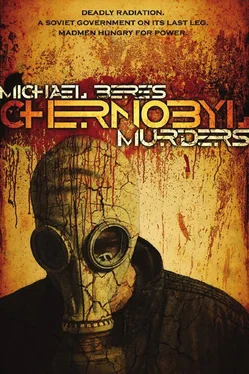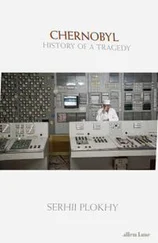Michael Beres - Chernobyl Murders
Здесь есть возможность читать онлайн «Michael Beres - Chernobyl Murders» весь текст электронной книги совершенно бесплатно (целиком полную версию без сокращений). В некоторых случаях можно слушать аудио, скачать через торрент в формате fb2 и присутствует краткое содержание. Жанр: Триллер, на английском языке. Описание произведения, (предисловие) а так же отзывы посетителей доступны на портале библиотеки ЛибКат.
- Название:Chernobyl Murders
- Автор:
- Жанр:
- Год:неизвестен
- ISBN:нет данных
- Рейтинг книги:4 / 5. Голосов: 1
-
Избранное:Добавить в избранное
- Отзывы:
-
Ваша оценка:
- 80
- 1
- 2
- 3
- 4
- 5
Chernobyl Murders: краткое содержание, описание и аннотация
Предлагаем к чтению аннотацию, описание, краткое содержание или предисловие (зависит от того, что написал сам автор книги «Chernobyl Murders»). Если вы не нашли необходимую информацию о книге — напишите в комментариях, мы постараемся отыскать её.
Chernobyl Murders — читать онлайн бесплатно полную книгу (весь текст) целиком
Ниже представлен текст книги, разбитый по страницам. Система сохранения места последней прочитанной страницы, позволяет с удобством читать онлайн бесплатно книгу «Chernobyl Murders», без необходимости каждый раз заново искать на чём Вы остановились. Поставьте закладку, и сможете в любой момент перейти на страницу, на которой закончили чтение.
Интервал:
Закладка:
“Sounds dangerous,” said Juli.
But what else could they do? If they tried to outrun the Moskvich, more militiamen would follow. The station was on the south end of town. If they could get out of town, perhaps embarrassing the militiaman in the Moskvich…
Lazlo handed the bottles of water and the wine bottle between the seats and had Juli secure them in back so they wouldn’t roll around. After waiting in silence for twenty-five minutes, Lazlo heard the distant whistle. He reached out and started the car.
Juli whispered from the back seat. “I’m frightened, Laz.”
“So am I. But listen. I’ll turn right when we leave the station, away from the tracks. If he follows, I’ll make a U-turn and go back before the train crosses the road. It won’t be going fast, but we will.
You might get bounced around.”
When he saw the train appear from behind a warehouse building along the track, Lazlo estimated its speed and its rate of decelera-tion. He counted to twenty. He put the Skoda in gear and began moving forward, counting again.
One… two… three…
The Moskvich closed in behind him.
Four… five… six…
He turned right, back toward downtown Berdichev, and the Moskvich followed.
Seven… eight… nine…
In the rearview mirror, the locomotive appeared above the station-house roof.
Ten… eleven… twelve…
Five or six seconds to get back to the tracks once he turned.
Thirteen… fourteen…
Now!
He cranked the wheel left and pressed the accelerator to the floor. The Skoda spun about, its tires squealing, its engine sputtering and missing, but finally roaring like a snarling dog. He didn’t bother shifting out of second gear and kept the accelerator pressed to the floor. In the mirror, the Moskvich was still turning around.
Ahead, the train engine was beginning to cross the road, faster than he had estimated. Too fast! He wouldn’t make it past the gate! Instead he aimed for the gate on the right, a hole to freedom ahead of the massive train engine, which now blasted its whistle.
“We’ll make it, Juli!” he shouted.
The gate smashed into pieces and flew over the Skoda. The front of the locomotive to the left was a moving wall. When the Skoda flew over the tracks, Lazlo felt a slight sideways jump of the Skoda’s tail like the skittering of a cat.
Behind him the Moskvich flashed its lights. But the flashing disappeared as the locomotive and the first few cars of the train filled the rearview mirror.
He couldn’t believe it. They had escaped!
In the side mirror he saw a dent in the rear fender of the Skoda where the locomotive had touched them. A gentle touch for a locomotive, a good-luck kiss.
Lazlo could see the mountains ahead as he shifted the Skoda into high gear and pushed the accelerator to the floor. “You can come out now!” he shouted to Juli in the back seat.
By midday two Volgas sped up to the Kopelovo collective office. Five men got out, three of them spreading out and questioning farmers who had gathered. Another man stayed by the cars and watched the road through the village. The fifth man was Major Grigor Komarov, who went directly to the office of the collective chairman and was told the location of the Zimyanins’ tent. When he left the office, Komarov summoned two of his men.
“What do others say about the Zimyanins?” asked Komarov.
“A man and woman claiming to be from the Opachichi collective near Pripyat,” said one of the men. “The description matches Horvath and Popovics.”
“A woman over there says they took the morning bus going to a collective farther south,” said the other man. “She saw Mrs. Zimyanin leave with a small suitcase.” The man pointed to the smoky yards behind the houses. “Their tent is the third one in over there.”
Komarov sent the men ahead, ducking below a clothesline as he followed. The men drew pistols, and the sight of them entering the tent made Komarov laugh. The flare of the tent reminded him of the massive skirts worn by a Wagnerian Valkyries he’d seen at the opera. His wet-behind-the-ears men entering the tent bent over with pistols drawn were like adolescent boys sneaking a look beneath a woman’s skirt. A toothless old man peeked out from another tent nearby. The old man grinned, his gums glistening pink in the morning sun. The entire scene, with campfires, tents, run-down houses, and peasants wandering about, was an opera.
Komarov laughed with the toothless old man until his own men came from the tent. Their pistols were put away, and one man shrugged his shoulders as the other spoke.
“They’re gone.”
“Of course, they’re gone,” said Komarov. “I expected them to be gone. But at least now we have a trail.”
Komarov sent his men to the collective chairman’s office, where there were two telephones his men were to use immediately. He ordered the bus heading south be searched by regional KGB personnel when it reached its destination and the passengers be thoroughly questioned. He ordered all militia offices within one hundred kilometers be contacted and given descriptions of Horvath and Popovics. He ordered the refugees and residents of the collective be informed they must tell all they know about the Zimyanins and their whereabouts or face penalties of noncooperation. Finally he ordered more men be sent from Kiev.
While his men used the phones at the collective office, Komarov went to the Zimyanin tent and went inside. An army blanket was spread on the floor of the tent. He kicked the blanket into a corner and found a slit cut into the floor. He reached through the slit and found the hard soil loosened. He poked around in the loosened soil. Nothing was there now, but it had recently been used as a hiding place.
After he searched the floor of the tent and found nothing, Komarov flipped the blanket over to see if anything had clung to it. The smell of damp wool was annoying, like sniffing beneath someone’s clothing. He carefully spread the blanket across the floor, lit a cigarette, and sat down. When he examined the blanket more closely, he noticed bits of white thread clinging to the wool. There were long pieces and short pieces, thousands of them, as if a white garment had been reduced to its elements. One piece of thread was attached to a small square of white cloth. He also found several strands of long hair, and holding them up to the light coming through the tent ceiling, guessed they were brown.
If he expected to catch Horvath, he should begin thinking like him. Horvath the fugitive, escaping at Visenka and going back to Kiev, staying at the Hotel Dnieper within blocks of KGB and militia headquarters. Horvath the refugee, remaining for days in one place, living in a tent instead of running. Horvath doing the opposite of what one would expect.
Outside the tent, Komarov could hear children running about, pots banging together. He had been in the tent long enough for life in the camp to return to normal. Family life. He blew cigarette smoke at the ceiling of the tent, imagined he was Detective Horvath with Juli Popovics by his side. If he were Detective Horvath, he would find somewhere to leave Juli Popovics and go to the only place he could go under the circumstances. Komarov threw his lit cigarette out through the narrow opening at the tent flap. Outside, a man began complaining loudly about his precious roll of toilet paper being stolen.
Komarov stood and left the tent. He walked quickly to the collective chairman’s office, waited for one of his men to finish a phone call, then called Captain Azef and ordered that extra men-no matter how green they were-be sent immediately to the Horvath family farm on the Ulyanov collective in the village of Kisbor near the Czechoslovakian frontier.
28
Интервал:
Закладка:
Похожие книги на «Chernobyl Murders»
Представляем Вашему вниманию похожие книги на «Chernobyl Murders» списком для выбора. Мы отобрали схожую по названию и смыслу литературу в надежде предоставить читателям больше вариантов отыскать новые, интересные, ещё непрочитанные произведения.
Обсуждение, отзывы о книге «Chernobyl Murders» и просто собственные мнения читателей. Оставьте ваши комментарии, напишите, что Вы думаете о произведении, его смысле или главных героях. Укажите что конкретно понравилось, а что нет, и почему Вы так считаете.












